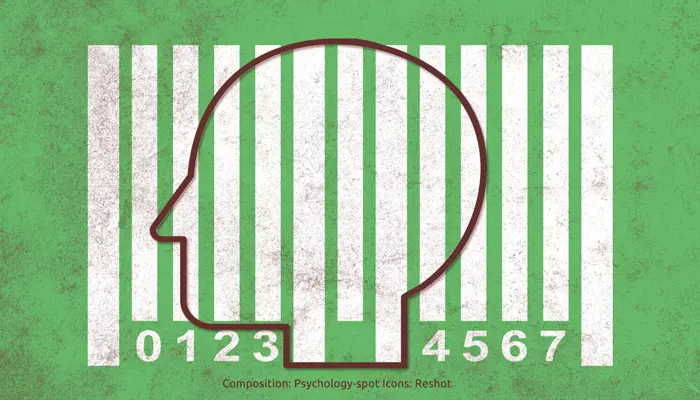
In a competitive society like the current one, we must learn to “sell ourselves well.” In fact, many of the most successful people are precisely those who know how to present themselves in the most flattering light possible. We do it when we prepare our resume, go to a job interview and even when we win over our partner.
According to Erich Fromm, this trend emerged with industrial society and has only worsened over the decades, with social networks being its epitome. The fact that people are forced to continually compete – exalting socially desirable qualities and hiding others – while focusing more on what they have than on what they are, has given rise to a phenomenon he called mercantile personality.
What is the mercantile personality? The disappearance of the authentic “self”
Of course, we all want to show our best version to the world. That desire arises from our need for validation and acceptance. But there is a substantial difference between striving to be our best and selling an attractive image.
Fromm believed that the mercantile personality occurs when we see ourselves as a commodity, so that we do not perceive our value as something we can use and enjoy, but rather it becomes mere “exchange value.” Thus we end up becoming a commodity in “the personality market.”
It’s a terrible thing because it means we think our intrinsic value as a person is not enough to succeed in the society we live in and we need to build a more sellable image.
Success then begins to depend largely on whether we know how to sell ourselves well in the market, whether we can showcase our qualities and capabilities by presenting them in an attractive “package.” Only then can we be “requested.” Only then can we be successful.
However, this seemingly innocuous belief ends up changing our attitude towards ourselves because “The ability and faculties to perform a given task are not enough; To be successful you must be able to ‘impose your personality’ in competition with many others.”
“If to earn a living you could depend on what you know and what you can do, self-esteem would be proportional to your own ability, that is, to the use value; but since success depends largely on how the personality is sold, the individual is conceived as a commodity […] The person is not concerned with his life and his happiness, but with becoming something pledgeable,” as Fromm wrote .
Embracing the mercantile personality leads to the almost complete disappearance of the “self.” “The goal of the mercantile character is complete adaptation, to be desirable in all conditions of the personality market,” Fromm explained. Therefore, people are forced to constantly change their values, attitudes and opinions following the principle: “I am as you want me to be,” which implies almost total submission to market norms.
However, the fact that authentic personalities disappear does not eliminate the ego. On the contrary, big egos abound in the market of personalities. The problem is that these egos lack a core, a sense of identity that weaves together their life history and supports their decisions.
In fact, Fromm stated that “The ‘identity crisis’ of modern society is actually the crisis produced by the fact that its members have become instruments without ‘self’, whose identity rests on their participation in companies (or in gigantic bureaucracies).” We are to the extent that we are successful and our ego depends on it while we forget our essence.
The emotional asepsis that prevents establishing deep bonds
Another side effect of the mercantile personality is emotional asepsis. “The mercantile character neither loves nor hates,” as Fromm indicated. These emotions do not fit into a structure that must be eminently functional and productive.
In fact, they are obstacles to achieving the main goal of the mercantile character: selling and changing. Or as this psychologist pointed out, “Function according to the logic of the ‘mega machinery’ of which they are part, without asking questions, except if they serve to promote.”
“Mercantile personalities do not feel deep affection for themselves or for others, they do not care about anything, in the deep sense of the word, and not because they are selfish, but because their relationships with others and with themselves are very weak.” Fromm explained.
This explains the current loss of empathy, apathy towards humanitarian disasters and even deafness towards the risk of a nuclear or ecological catastrophe. “The lack of concern at these levels is the result of the loss of all emotional ties, even with the beings closest to them,” an idea that finds echo in the concept of liquid relationships that prevail in our times, according to Zygmunt Bauman.
The problem is not that the mercantile personality can make us selfish or narcissistic – although it also has that power – but it distances us so much from ourselves that we are incapable of truly getting closer to others. If we are not able to tune in with ourselves, how are we going to tune in with others? We become incapable of establishing that deep emotional bond that occurs when two authentic souls touch.
The commercial personality that Fromm warned us about is a kind of alienated character: “People are alienated from their work, from themselves, from other human beings and from nature,” he explained.
In this context, emotions are nothing more than passing storms that do not cause authentic change or generate a connection. They are more protozoan reactions than seeds in which deep feelings can germinate because they are born and die in the field of indifference, in the rush to sell ourselves better to the highest bidder and achieve the temporary success that society imposes. Although the price is high: losing our identity along the way.
Source:
Fromm, E. (2001) Avere o essere? Mondadori: Milano.



